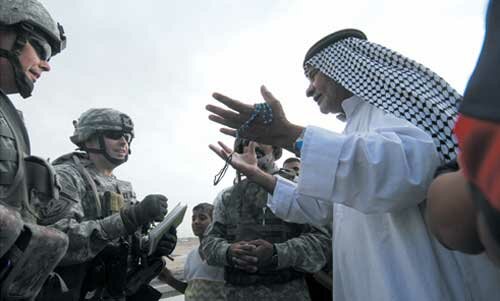Window Of Opportunity?

A Shia sheik in Ghazaliya talks to U.S. Troops
Window of Opportunity
By Rich Lowry
Baghdad — “What do you do when Robert E. Lee and Stonewall Jackson offer to put down their arms?”
That’s the rhetorical question posed by an officer of the 2nd Brigade 1st Infantry Division prior to a morning Humvee patrol here. He is analogizing Sunnis who have abandoned the insurgency to the famous rebels Lee and Jackson, and directing his question to the Shia-led central government.
Inspired tactics by our troops, coupled with a Sunni turn against al-Qaida, have — in a microcosm of what’s happening throughout Iraq — transformed the northwest part of Baghdad controlled by this brigade. “People ask me if we’re at a tipping point,” says the brigade’s leader, Col. J.B. Burton. “I say, ‘No, we have a window of opportunity.’”
The opportunity is knocking at, among other places, an intersection on one of the main roads in the Sunni neighborhood of Ghazaliya. Once, Americans couldn’t come here without getting hit. Now, they stop and get out to shake hands with some of the same people who had been shooting at them.
They are the “Ghazaliya Guards,” local Sunnis who volunteered to police their neighborhood and man a checkpoint controlling access in and out. They don’t look like much. One American soldier jokes that their plain tan uniforms could have been bought at JCPenney. But they have been a game-changer.
Ghazaliya had been a middle-class area with lots of retirees from Saddam Hussein’s army, but became the focus of what Col. Burton calls a “no-kidding sectarian war.” The road was the fault line between Moqtada al Sadr’s Shia militia, the Jaish al Mahdi (JAM), which terrorized the Sunnis from one direction, and the Sunni terror group al-Qaida in Iraq, which infiltrated from the other.
Col. Burton points out a vacant lot that had been piled high with trash and was a dumping ground for dead bodies. Now, it is empty (but for a green pool of raw sewage). The neighborhood is still trashed, with garbage strewn everywhere, but people are walking the streets, and a kind of blighted normalcy prevails.
There were two keys to this turnaround. First, the U.S. pushed back against JAM, whose depredations had driven Sunnis into the arms of al Qaeda. Two, it instituted population-control measures that squeezed al Qaeda. This created the opening for what American troops call “the honorable resistance” — Sunni insurgents who weren’t Islamist terrorists — to reject al Qaeda and basically switch sides in the war.
Politicians in the U.S. often argue that we should “stop policing the civil war” and “go back to our bases” to focus on “counterterrorism.” The experience of Ghazaliya says otherwise — tamping down the civil war and getting out in the streets created the predicate for prying Sunnis from al Qaeda in an enormous blow to the terror group.
A similar turn has happened throughout Iraq, with tens of thousands of Sunnis allying with Americans and volunteering for local police forces. But American officers worry that the Shia government won’t welcome them into formal government-security forces, which would be a crucial step toward Sunni-Shia reconciliation.
This balkanized city, a dusty maze of concrete and barbed wire, is a tableau of sectarian governance. Ghazaliya has no government services and it shows, while a short distance away the Shia neighborhood of Kadhimiyah has curbs freshly painted yellow-and-white and storefronts that, as one officer says, almost look like they could be in Naples, Italy.
What worries the Shia is precisely that Sunni volunteers not too long ago were facilitating horrific acts of terrorism against them. Why should they trust them now? This legitimate concern is augmented by Shia paranoia and insecurity. In the absence of a bold act of outreach by the government, we pay the Sunni volunteers and work to improve their communities, trying to foster their change of heart.
“There’s a risk of this turning off and going back,” says Burton. Lee and Jackson appear ready to surrender. But will the Iraqi government accept it?
NRO



 Be respectful of others and their opinions. Inflammatory remarks and inane leftist drivel will be deleted. It ain’t about free speech, remember you’re in a private domain. My website, my prerogative.
Be respectful of others and their opinions. Inflammatory remarks and inane leftist drivel will be deleted. It ain’t about free speech, remember you’re in a private domain. My website, my prerogative. If you can't handle using your real email address, don't bother posting a comment.
If you can't handle using your real email address, don't bother posting a comment.
“There’s a risk of this turning off and going back,” says Burton. Lee and Jackson appear ready to surrender. But will the Iraqi government accept it?
The correct question is “does the Shia government have the ability to accept the surrender?” Or “will the Shia governments handlers in Tehran allow them to accept peace with the Sunnis?”
Tehran desires a loss by the US military more than it desires a peaceful neighbor with a democratic government. Bastards
October 5th, 2007 at 7:09 am